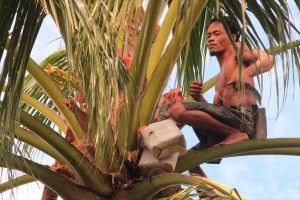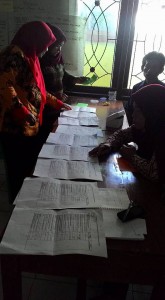Of approximately 2,800 coconut farmers in Gumelem Kulon, 74 have been registered as recipients of regional health insurance assistance (Jamkesda).
The fate of coconut farmers (penderes) is a particular concern for women who are members of the Sidaluhur Sejati women’s organization in Gumelem Kulon village, Susukan sub-district, Banjarnegera regency. Advocacy for health insurance for penderes is one form of their efforts to reduce poverty in the village. The advocacy they conducted was based on local data on welfare, namely the data that had been produced by women in the village during the Women’s School previously run by Infest Yogyakarta. The data includes assets and potential data, priority of public services, proposals for marginal groups, and welfare data based on local indicators.
The data produced by the women of Gumelem Kulon is not only utilized by the Gumelem Kulon village government (Pemdes) as a reference for the village medium term development plan (RPJMDesa). However, it is also used as beneficiary data, such as local welfare data, as the main data source for health insurance assistance programs for Penderes. The appearance of the names of 74 penderes registered as Jamkesda beneficiaries does not mean that the women’s struggle is over. The importance of continuing to oversee the health insurance process for these penderes was also further discussed in the routine meeting of the women’s organization Sidaluhur Sejati on Wednesday (05/25/2016).
Why Penderes?
 Most of the penderes in Gumelem Kulon village are laborers, known through the terms ‘penderes’ or palm sugar farmers. In carrying out their profession, they not only have to deal with acting as a middlemen, but also risk their lives, especially during the rainy season. Some of these workers do not get holidays because if they are only a few hours late, the sap from the plant can no longer be processed into sugar. Even if it is cooked, this sour juice will only become wild sugar. Lettuce sugar is the name of the thick juice form of sugar that cannot dry, and is printed into sugar. This sugar is a disaster for the penderes, as the price is very low.
Most of the penderes in Gumelem Kulon village are laborers, known through the terms ‘penderes’ or palm sugar farmers. In carrying out their profession, they not only have to deal with acting as a middlemen, but also risk their lives, especially during the rainy season. Some of these workers do not get holidays because if they are only a few hours late, the sap from the plant can no longer be processed into sugar. Even if it is cooked, this sour juice will only become wild sugar. Lettuce sugar is the name of the thick juice form of sugar that cannot dry, and is printed into sugar. This sugar is a disaster for the penderes, as the price is very low.
To obtain good quality sugar, a penderes must immediately cook the sap that they get. In the past this was done with large stoves and firewood. Now they do it on a special stove with sawdust (sawn) or compacted rice husk. Sawn and straw are very easy to get from wood cutting factories or “rice mills” in the village, or from the neighbouring villages.
Pon or legi is the moment that all penderes wait for. This is the time when they recieve their cash from selling sugar. It can be sure that on this market day, stalls, markets and kiosks in my small village are crowded with penderes and their families, who are shopping for basic daily necessities.
According to Tursiyem, one of the administrators of the women’s organization Sidaluhur Sejati, penderes were one of the village’s assets, but also constituted a challenge for the village. Based on the survey results of local women, there were around 2,800 farmers in the village who collected sap from 60,077 coconut trees. So, it is very important for the village to pay attention to their ability to access social health insurance.
The Importance of Aid Recipient Data Verification
Welfare data-based advocacy carried out by these women received support from both the village government and the local government, in this case from the Office of Community and Village Empowerment (KPMD) and the Regional Development Planning Agency (Bappeda) of Banjarnegara District.
“It turns out women are more thorough. From our region, 812 hectares, where there are 62 RTs and 11 RWs, these mothers walk from house to house to collect data. We are quite proud of the Women’s School in 2015, which I believe later can help with data collection. Because all this time the data from the BPS in 2011 (the Central Statistics Agency) are far from valid. So, the expected results of these mothers’ data can be used as standard data (stipulated by the Village Regulation) for village programs,” said Arief Machbub, Head of Gumelem Kulon Village.
Kades Gumelem Kulon also added that there are many farmers who continue working until the age of 50 or above. These penderes are at risk of falling, potentially causing disability and even die. In early 2016, three people died from falling from coconut trees. 1 case occured in each RW 4, RW 6, in RW 9, relating to health insurance. But of around 2,800 penderes, only 74 were registered. This is according to the Gumelem Kulon village head, because of the limited quota of aid recipients.
Advocacy efforts carried out by the women’s organization Sidaluhur Sejati will continue. One of the steps taken is to verify the data of those who recieve contributions (PBI), owned by the village as well as the Office of Social, Manpower and Transmigration of Banjarnegera Regency. In the verification process it will be determined whether the existing PBI data is in accordance with local welfare data. If it is not in accordance, then the Pemdes needs to make improvements and ensure that the PBI recipient data is in accordance with the village’s local welfare data through the Village Deliberation Agreement (Musdes). [Alimah]
